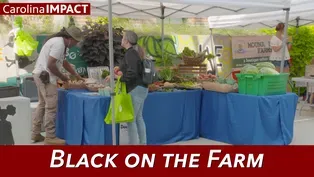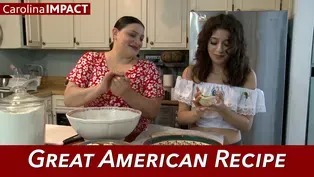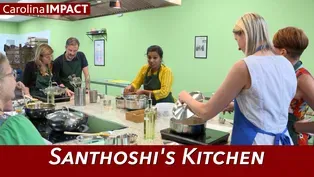
Drone Grown Crops
Clip: Season 12 Episode 1201 | 5m 58sVideo has Closed Captions
Home grown & 'drone grown' -- Carolina farmers use new technology to raise better crops.
Drive an hour from Charlotte in any direction, and chances are you'll probably find yourself on a farm. We're a city surrounded by agriculture. And farming here in the Carolinas isn't what it used to be. Meet today's farmers who are using new drone technology to grow better crops, and bigger profits -- with the push of a button, and the 'whoosh' of a propeller.
Problems with Closed Captions? Closed Captioning Feedback
Problems with Closed Captions? Closed Captioning Feedback
Carolina Impact is a local public television program presented by PBS Charlotte

Drone Grown Crops
Clip: Season 12 Episode 1201 | 5m 58sVideo has Closed Captions
Drive an hour from Charlotte in any direction, and chances are you'll probably find yourself on a farm. We're a city surrounded by agriculture. And farming here in the Carolinas isn't what it used to be. Meet today's farmers who are using new drone technology to grow better crops, and bigger profits -- with the push of a button, and the 'whoosh' of a propeller.
Problems with Closed Captions? Closed Captioning Feedback
How to Watch Carolina Impact
Carolina Impact is available to stream on pbs.org and the free PBS App, available on iPhone, Apple TV, Android TV, Android smartphones, Amazon Fire TV, Amazon Fire Tablet, Roku, Samsung Smart TV, and Vizio.

Introducing PBS Charlotte Passport
Now you can stream more of your favorite PBS shows including Masterpiece, NOVA, Nature, Great British Baking Show and many more — online and in the PBS Video app.Providing Support for PBS.org
Learn Moreabout PBS online sponsorship- Yeah, our story starts here in Shelby where we're surrounded by about 40 acres of soybeans.
Now, there's a lot of ways to farm a crop like this.
In the old days, they used mules.
Today most growers use tractors, but for a few, well, they're trying something new.
How about a crop that's not just homegrown, but also drone grown?
♪ Come fly with me ♪ Let's fly ♪ Let's fly away From a hundred feet away, we're watching this farm drone spray acre after acre row, after row.
The crop itself about 12 feet below.
♪ Come fly with me ♪ Let's fly ♪ Let's fly away - [Tucker] I'm gonna be flying across the field spraying and checking for weeds at the same time.
- And that's the voice of Tucker Green, who's also watching on his screen.
- You know, I can see if we've got a weed problem or if we've got a grass problem.
If something's present, I'll be able to see it with this camera.
♪ Come fly with me ♪ Let's take up in the blue If you'd have told me when I was 18 years old, I'd be selling drones and flying drones to spread crops, I'd called you crazy, - [Jeff] But today, Green's family grows 4,000 acres of corn and soybeans on this seventh generation farm using a new generation of farm technology that's actually cheaper than the old way to spray.
(drone humming) - Okay, you're saving money on yield.
You're not damaging your crop by running over it, but at the same time, you're not burning hardly any fuel.
I have batteries that I charge when I'm spraying with the drone.
I might burn 15 to $20 a day in gasoline to charge the batteries, whereas, you know, we're talking about burning 15, 20, $30 a a hour spraying with a ground rig.
Soybeans, pumpkins, orchards, you name it, you know it's been done with the drone, so.
♪ Come fly with me ♪ Let's fly ♪ Let's fly away Now we, now we've got some water transferring over into the drone here.
- [Jeff] Green shows us what he shows other farmers who come here to learn how it's done.
From tanking it up.
- All right, clicked off there, slammed full.
- [Jeff] To cranking it up.
- So we can go ahead and hit start.
And here, it's gonna take 66 gallons to spray this field out.
(jazzy music) And it does stir a little bit of dust, huh?
Now this drone is actually smart enough to know where it's gonna run outta liquid at based on how much is in it.
And it's keeping up with all that fully autonomously.
I'm not adjusting any height, I'm not adjusting any speed.
I can adjust that if I wanted to.
I can slow it down, change my application rate, height, droplet size, all that stuff.
I can adjust on the go while it's flying.
But from there it pretty much takes care of it itself.
- [Jeff] Green adds that his drone not only flies itself, but it also pays for itself, especially compared to traditional ground sprayers that cost at least 10 times more.
- All the way up to, you know, $750,000 if you wanna buy a new one.
- What's the drone cost?
- About anywhere from 25 to $35,000.
- Wow.
- So the initial savings, the startup savings are significant.
- [Jeff] You're doing it and you're succeeding with it.
How many other farms and farmers are are doing the same thing?
- [Tucker] It's becoming a more common thing.
It's definitely up-and-coming.
(drone humming) - [Jeff] But what about the smaller farms where some spraying is still done by hand?
Well, here at St. Paul Mountain Vineyards in Hendersonville- - How's that?
- They found out you don't have to buy a drone to try it yet.
- So this field here is three acres.
We're not having to pull a tractor and a big sprayer, big tanks.
- [Jeff] Instead the winery hired Chris Plummer, a drone sprayer from South Carolina who brings his drone to them.
- We're doing avian control to help keep the birds off the vines.
- [Jeff] Gotcha.
(drone humming) - The drones have really saved us time and money.
- [Jeff] Vineyard owner Alan Ward says St. Paul is the first winery in North Carolina to use drones for spraying.
And this year's first crop of drone grown grapes is first quality too.
- What you're looking at here, you've got good leaves, which obviously that gets our photosynthesis going.
Got good clean grapes, no disease.
With that drone, it really sprays right on the grape and we want to be good to the environment as well as the neighbors.
And we'll use about a fifth of the material because it's going right on the grapevine.
- [Jeff] Yeah.
(mellow country music) You were a traditional winemaker.
Was it difficult picturing this kind of technology in your vineyard?
- You know, early on I had my doubts.
Yeah.
I was skeptical.
Talking about it is one thing, but actually pulling it in and doing it is another, but the ultimate goal is clean fruit come September.
So I'm hoping if we can get there with a drone then there's no problem.
Even if it was a little more expensive to get him here, I think we would still do it- - Right.
- Because of the effectiveness of it.
(mellow country music) - Our farms year after year are having to become more and more efficient.
How can we increase yields, increase our bottom lines?
The agriculture spray drone industry is something that's gonna take off in the next decade.
It really is truly remarkable what they've been able to do and it's been nothing but a blessing for not only my farm but my family.
- By the way, once this farm drone is ready to land, well it's not on the ground for very long.
The whole process of refilling the spray tank and then changing the batteries only takes about one minute, just to pit stop before it's ready to spray more crop.
Video has Closed Captions
Clip: S12 Ep1201 | 5m 41s | See why there’s a growing trend of African Americans becoming farmers and owning land. (5m 41s)
Carolina Impact | September 17th, 2024
Preview: S12 Ep1201 | 30s | Home grown & "drone grown", Black on the Farm, Santhoshi's Kitchen, and The Great American Recipe. (30s)
Video has Closed Captions
Clip: S12 Ep1201 | 6m 4s | Two local contestants compete on season three of PBS's The Great American Recipe. (6m 4s)
Video has Closed Captions
Clip: S12 Ep1201 | 5m 25s | A Fort Mill chef follows her dreams while teaching others about Indian cuisine. (5m 25s)
Providing Support for PBS.org
Learn Moreabout PBS online sponsorshipSupport for PBS provided by:
Carolina Impact is a local public television program presented by PBS Charlotte














